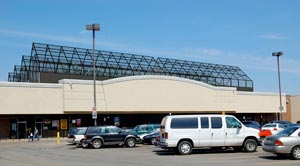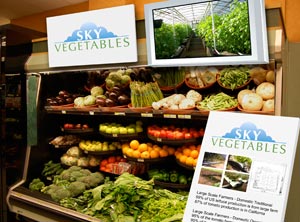Veggies in the sky: Grocery business takes top honors in Burrill contest
In an era of globe-trotting food, consumers sometimes need an atlas to navigate the produce aisle. But two University of Wisconsin–Madison students have an intriguing idea for how to get vegetables on grocery shelves without the jet lag.


An artist’s rendition of a Sky Vegetables’ greenhouse and produce section.
Their solution? Look up.
"We started thinking about where you can find flat space to grow things, and the answer seemed kind of obvious," says Keith Agoada, a senior in the UW–Madison School of Business. "Rooftops."
That’s where Agoada and MBA student Troy Vosseller hope to plant Sky Vegetables, a business venture that envisions growing fresh fruits and vegetables on top of existing U.S. supermarkets. The students’ concept — which capitalizes on emerging consumer demand for locally grown produce and environmental sustainability — won first place during the School of Business’ G. Steven Burrill Business Plan Competition last week, earning them a $10,000 prize. They now move on to compete in the fifth annual Governor’s Business Plan Contest, which will award $200,000 in startup money and services during the Wisconsin Entrepreneurs’ Conference in June.
View a complete list of Burrill winners.
For Agoada, who will graduate with a degree in management in May, the prize offers hope of getting his vision off the ground-literally. He came up with the idea while working as an intern in UW–Madison’s botany greenhouses, a job he initially sought as a diversion from his business studies. But he soon found himself surfing the Web for information on greenhouse gardening, which prompted him to begin thinking about commercial applications.
To create a business plan, Agoada joined forces with Vosseller, one of the two students behind Sconnie Nation, an apparel start-up that recently opened a store on State Street. Together, they began collecting information on structural engineering, agriculture and grocery marketing. Drawing on international expertise, they forged a plan to grow fruits, vegetables and flowers using hydroponics, a water-based form of agriculture that can produce high yields in limited space.
But the real appeal of Sky Vegetables is proximity. During their research, the students learned that the average piece of supermarket produce is picked seven to 14 days before it arrives on grocery shelves, and it travels some 2,000 miles to get there. In contrast, Sky Vegetables would be grown on-site, ensuring that they arrive on shelves moments after being picked. The greenhouse-grown produce would be sold in special sections in participating groceries.
"Everyone learns from their parents that fresh vegetables are better tasting and better for you," says Agoada. "If you can prove undoubtedly that you’re offering fresher vegetables, that’s something everyone can recognize."
UW-Madison horticulture professor Brent McCown, who advised the students as they wrote their plan, imagines that a grocery with a rooftop greenhouse "would have a huge marketing advantage" over competitors. "This really is a new way to tap into consumer interest in foods that are locally produced and healthy to eat," he says. "If the greenhouse is on the roof, you can’t get much more local than that."
Agoada and Vosseller have not yet approached groceries with their concept, but they hope to find a site for a prototype greenhouse in the next year, says Agoada.
"We’re going to be patient," he says. "I just won this contest, so I’ve got some money to live off of for now. We’re going to wait for the right supermarket that wants to do this with us."
Tags: business, entrepreneurship, learning, student life



